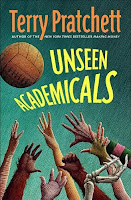 I was thrilled to see that Terry Pratchett had a new Discworld book coming out; I thought the world might already possess the last one it was going to receive. I was thrilled again--though slightly alarmed--to see it on a right-in-front-of-the-door, new-books-at-50%-off promotional table at Barnes and Noble. I bought the book right away, and returned my library copy, but wondered uneasily if it was on that table because it was not selling well. Or, more optimistically, if it was such a big name that it could be a loss leader or something. I'm going to believe the latter explanation, despite not really knowing what a "loss leader" is or how it works, so please do not tell me if you have information to the contrary.
I was thrilled to see that Terry Pratchett had a new Discworld book coming out; I thought the world might already possess the last one it was going to receive. I was thrilled again--though slightly alarmed--to see it on a right-in-front-of-the-door, new-books-at-50%-off promotional table at Barnes and Noble. I bought the book right away, and returned my library copy, but wondered uneasily if it was on that table because it was not selling well. Or, more optimistically, if it was such a big name that it could be a loss leader or something. I'm going to believe the latter explanation, despite not really knowing what a "loss leader" is or how it works, so please do not tell me if you have information to the contrary.In my ideal world, Pratchett would write two new books a year, timed to coincide with Christmas and my birthday, and they would all be about the characters in the Watch. I am never very excited when Pratchett introduces a new group of characters, but as I read I come to understand that in his wisdom he has not gone wrong. And in subsequent readings I like the new characters more and more, and realize that he has done the exactly right, best, most perfect thing. This book, which introduces yet more characters, is no exception. I read it with Amy and we enjoyed it very much.
It's hard not to look for telltale signs of the author's early-onset Alzheimer's ("is the loosened-up, slightly...different Vetinari any kind of stand-in for the author himself?") but I suppose that's something we'll just have to deal with from now on. I for one am thrilled to have gotten this next book, and will treasure whatever else Pratchett authors. Apparently he is indeed hard at work on the next novel in the Discworld series. Go, man, go!
PS:
For some reason, almost everyone I talk to has never heard of Terry Pratchett, despite his having sold millions upon millions of books worldwide. Which raises the question: who is buying these books? Is it one person? Where are they?
Anyway, I do a crummy job of explaining Pratchett to people who have not read him. I launch into my paean, and about four seconds in, people go "hmm" in a way that indicates they are hiding their true feelings. I should probably just mention to people that he was KNIGHTED by the QUEEN for services to literature, and leave it at that.
But I just can't help going on! He's a genius! Did you know you could even get knighted for services to literature? I didn't.









